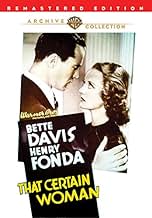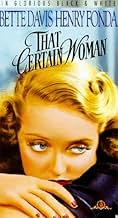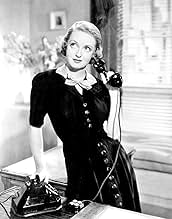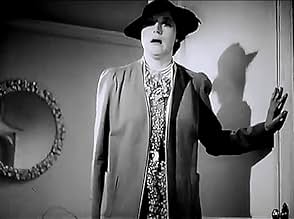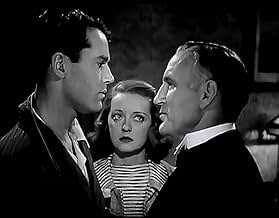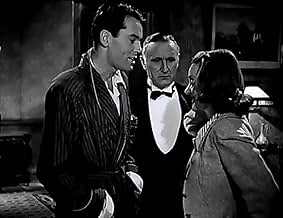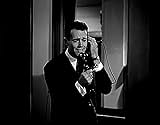AVALIAÇÃO DA IMDb
6,4/10
1,8 mil
SUA AVALIAÇÃO
Adicionar um enredo no seu idiomaMary Donnell, a young legal secretary with a past, elopes with a client's son, but his father has the marriage annulled without knowing she's pregnant.Mary Donnell, a young legal secretary with a past, elopes with a client's son, but his father has the marriage annulled without knowing she's pregnant.Mary Donnell, a young legal secretary with a past, elopes with a client's son, but his father has the marriage annulled without knowing she's pregnant.
- Prêmios
- 1 vitória no total
Katharine Alexander
- Mrs. Rogers
- (as Katherine Alexander)
Mary Philips
- Amy
- (as Mary Phillips)
Richard DeNeut
- Boy
- (as Dickie DeNeut)
John Hamilton
- American
- (cenas deletadas)
Edward Keane
- Opposing Counsel
- (cenas deletadas)
Avaliações em destaque
Secretary Bette Davis has her dishonorable past unearthed after a reporter breaks the story that she's the widow of a notorious gangster once involved in the St. Valentine's Day Massacre; this leads to the quick dissolution of Davis' even quicker marriage to Henry Fonda, but not before Bette can conceive a child! A few dry, amusing wisecracks in this remake of the silent drama "The Trespasser"--and some unintended laughs and head-scratching details as well. Davis keeps refusing offers of cigarettes (!), she types a letter to Fonda we never get to read, she packs her kid off without his toys and then blows forlornly on his whistle. The kid is a solemn tyke who seems to have a fixation on being a sailor, even while Fonda's new wife pays Davis a visit (in a wheelchair!) and trades confessions with her in front of a roaring fire which never seems to die down. Busy programmer would not be of much interest were it not for Bette's terrific performance; she's serious and focused--and sensitive when she should be--and she grounds this story in a bit of reality. Henry Fonda and the supporting players are also very good, especially Mary Phillips as Amy. The film opens confusingly and takes a while to get its bearings, yet the sequence where Bette meets her father-in-law for the first time is a superbly controlled dramatic moment in which everyone excels. Not a particularly witty or gripping picture, but certainly not bad, either. **1/2 from ****
Mary Donnell (Bette Davis) has a checkered past as a gangster's young widow. Now, she's lawyer Lloyd Rogers' secretary. She falls for wealthy playboy client Jack Merrick (Henry Fonda) and they get a quickie marriage. His father disapproves of her.
It's a melodrama with star Bette Davis and future star Henry Fonda. Bette is able to keep the story moving with her superior acting. Fonda is a little miscast although this is very early in his career. He hasn't settled into his everyman genuineness. He's still a good romantic lead. He isn't able to bring out the flaws in his character. In the end, this is mostly about Bette and she makes this work.
It's a melodrama with star Bette Davis and future star Henry Fonda. Bette is able to keep the story moving with her superior acting. Fonda is a little miscast although this is very early in his career. He hasn't settled into his everyman genuineness. He's still a good romantic lead. He isn't able to bring out the flaws in his character. In the end, this is mostly about Bette and she makes this work.
Here, Davis plays a secretary, Mary Donnell, with a past: she was once married to a mobster when she was very young. He is now dead but the press will not let her forget her past and move forward. Jack Merrick , Jr. (Henry Fonda) is in love with Mary. He marries her—promising to stand on his own feet rather than living off of his wealthy father, (Donald Crisp). But Jack's father first forbids the marriage then, after they get married, he has it annulled, and sweeps Jack off to Europe.
However, Mary has Jack's baby and names him Jackie. She is emotionally supported by her maid, Amy (Mary Philips)-who here plays a role something like Thelma Ritter would play in later movies. Mary is also supported by her understanding boss, Lloyd Rogers (Ian Hunter), who has an unhappy marriage and is not-so-secretly in love with Mary. But, his love is unrequited.
As the years pass and little Jackie grows, Mary remains in love with Jack: she can't get him out of her mind. Jack marries in Europe and he and his wife, 'Flip' (Anita Louise), are in a bad car accident that leaves her in a wheelchair for life. When Jack and Amy return to America, they both re-enter Mary's life: Jack is introduced to, and falls in love with, his 4-year-old son. 'Flip' makes a point of visiting Mary to ask her to marry Jack so that he can have a 'full life' with Mary and little Jackie.
This is one of those Bette Davis melodramas in which she is asked to make personal sacrifice(s), but the movie has too MANY of these moments. In fact until the end, we are left wondering who she will have to sacrifice: Jack?—Jackie?—both?-neither? The only 'villains' of this movie are Jack's father, who continually foils the love between Mary and Jack, and the tabloid newspaper reporters who won't leave Mary alone.
Surprisingly, the other women, of the movie (Mrs. Rogers, Flip, and even Amy)--who should resent Mary--are always way TOO understanding towards her. Not only does the movie suffer from an excess of these moments but the ending is WAY contrived too.
It's too bad, because the movie seemed to show some promise at the beginning. All this aside, Bette Davis' acting is still the great stuff that we have learned to expect from her.
However, Mary has Jack's baby and names him Jackie. She is emotionally supported by her maid, Amy (Mary Philips)-who here plays a role something like Thelma Ritter would play in later movies. Mary is also supported by her understanding boss, Lloyd Rogers (Ian Hunter), who has an unhappy marriage and is not-so-secretly in love with Mary. But, his love is unrequited.
As the years pass and little Jackie grows, Mary remains in love with Jack: she can't get him out of her mind. Jack marries in Europe and he and his wife, 'Flip' (Anita Louise), are in a bad car accident that leaves her in a wheelchair for life. When Jack and Amy return to America, they both re-enter Mary's life: Jack is introduced to, and falls in love with, his 4-year-old son. 'Flip' makes a point of visiting Mary to ask her to marry Jack so that he can have a 'full life' with Mary and little Jackie.
This is one of those Bette Davis melodramas in which she is asked to make personal sacrifice(s), but the movie has too MANY of these moments. In fact until the end, we are left wondering who she will have to sacrifice: Jack?—Jackie?—both?-neither? The only 'villains' of this movie are Jack's father, who continually foils the love between Mary and Jack, and the tabloid newspaper reporters who won't leave Mary alone.
Surprisingly, the other women, of the movie (Mrs. Rogers, Flip, and even Amy)--who should resent Mary--are always way TOO understanding towards her. Not only does the movie suffer from an excess of these moments but the ending is WAY contrived too.
It's too bad, because the movie seemed to show some promise at the beginning. All this aside, Bette Davis' acting is still the great stuff that we have learned to expect from her.
In spite of it's impressive leads and the usually sure handed direction of Edmund Goulding That Certain Kind of Women is a lumbering, mawkish an implausible melodrama. Disjointed at times you get the feeling a reels missing.
Where do we begin. Ex-moll Mary Donnell is trying to go straight as an executive secretary for Lloyd Rogers who though married has a thing for Mary. Mary though falls for Jack Merrrick Jr. (Henry Fonda) much to the chagrin of Jack Sr. (Donald Crisp) who gets sonny's marriage annulled by playing hardball with her past. The two part he remarries and she has his kid. Years pass, Rogers dies and leaves her a ton of cash. Junior comes back finds out and vows to leave his crippled wife who pays a visit to Mary before they run off. Enough already.
Your drowning in suds in no time in this 30s chick flic that never finds a way to amp up the passion with characters that are tender sensitive and dull beyond belief. Davis stands around looking cow eyed most of the way while Fonda wimps about and Crisp remains stone like. Tina Louise rolls in on a wheelchair in the last act as wife "Flipp" and wrestles with Davis in another cloying moment of tear jerk to see who will make the greater sacrifice. No contest, the audience has.
Where do we begin. Ex-moll Mary Donnell is trying to go straight as an executive secretary for Lloyd Rogers who though married has a thing for Mary. Mary though falls for Jack Merrrick Jr. (Henry Fonda) much to the chagrin of Jack Sr. (Donald Crisp) who gets sonny's marriage annulled by playing hardball with her past. The two part he remarries and she has his kid. Years pass, Rogers dies and leaves her a ton of cash. Junior comes back finds out and vows to leave his crippled wife who pays a visit to Mary before they run off. Enough already.
Your drowning in suds in no time in this 30s chick flic that never finds a way to amp up the passion with characters that are tender sensitive and dull beyond belief. Davis stands around looking cow eyed most of the way while Fonda wimps about and Crisp remains stone like. Tina Louise rolls in on a wheelchair in the last act as wife "Flipp" and wrestles with Davis in another cloying moment of tear jerk to see who will make the greater sacrifice. No contest, the audience has.
Audiences will groan at the character of Mary Donnell. Bette Davis is normally looking out for number one--and she's definitely her good old self in the first half of the movie. The widow of a gangster, Donnell has become a super-competent legal secretary for a respected attorney in a big firm. She fends off unwanted press attention and generally handles herself quite well as a tough single girl in the big city.
She becomes the mistress of her married boss at the law firm (although the Hays Office undoubtedly required the removal of any breath of sexual content here, it should be pretty obvious to all what is going on). In the second half of the movie, which focusses on Jack Merrick (Henry Fonda), whom Donnell has always loved, she achieves peaks of self-sacrifice that will send you staggering to the bathroom to throw up.
This is the sort of film that gives soap opera a bad name.
She becomes the mistress of her married boss at the law firm (although the Hays Office undoubtedly required the removal of any breath of sexual content here, it should be pretty obvious to all what is going on). In the second half of the movie, which focusses on Jack Merrick (Henry Fonda), whom Donnell has always loved, she achieves peaks of self-sacrifice that will send you staggering to the bathroom to throw up.
This is the sort of film that gives soap opera a bad name.
Você sabia?
- CuriosidadesWith Bette Davis rising quickly through the ranks at Warner Brothers, she was able to choose her leading men, and for Cinzas do Passado (1937) she chose Henry Fonda. Their lives had intersected a decade earlier when they worked in the same New England summer stock company. Even before that portion of their lives, they had met when Fonda gave the 17-year-old Davis a tour of Princeton University. One night, Fonda later wrote, while he and a friend took Davis and her sister out for a tour of the campus by moonlight, he nervously gave Davis an innocent kiss on the lips. A few days later he received a letter from her: "I've told mother about our lovely experience together in the moonlight. She will announce the engagement when we get home." Fonda was so naïve that he wasn't sure at first whether this was a joke! Davis remembered and liked Fonda enough to request him for this film and then again for Jezebel (1938).
- Erros de gravaçãoThe screen shows a newspaper page with headlines, photographs, and a box in large type, all part of a full-page gangster story. However, only some of the text that can be seen around the edges is part of the story. The rest is "dummy" type, about clothes for college men or electrical equipment.
- Citações
Lloyd Rogers: [to Mary] Money! I've got loads of it, and I'm one of the unhappiest men in the world!
- Cenas durante ou pós-créditosThe opening credits roll up.
- ConexõesFeatured in Breakdowns of 1938 (1938)
- Trilhas sonoras'Cause My Baby Says It's So
(1937) (uncredited)
Music by Harry Warren
Played during the scene at the bar
Principais escolhas
Faça login para avaliar e ver a lista de recomendações personalizadas
- How long is That Certain Woman?Fornecido pela Alexa
Detalhes
- Data de lançamento
- País de origem
- Idioma
- Também conhecido como
- That Certain Woman
- Locações de filme
- Empresa de produção
- Consulte mais créditos da empresa na IMDbPro
- Tempo de duração
- 1 h 33 min(93 min)
- Cor
- Mixagem de som
- Proporção
- 1.37 : 1
Contribua para esta página
Sugerir uma alteração ou adicionar conteúdo ausente


